Nouvelle Vague is a french film of genre Drama directed by Jean-Luc Godard with Alain Delon
Nouvelle Vague (1990)
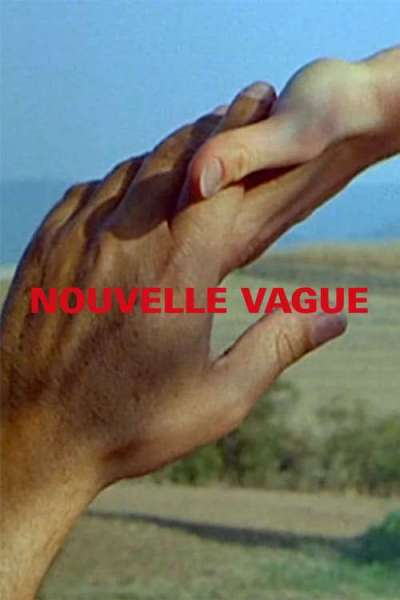
If you like this film, let us know!
- Infos
- Casting
- Technical infos
- Photos
- Videos
- Film quotes
- Characters
- Music
- Awards
Nouvelle Vague (English: New Wave) is a 1990 French film written and directed by Jean-Luc Godard. It follows the story of hitchiker Lennox (Alain Delon) credited as "Lui" ("Him"), taken in by a wealthy industrialist, Elena Torlato-Favrini or "Elle" ("Her"), played by Domiziana Giordano. The film was entered into the 1990 Cannes Film Festival.
Synopsis
La Contessa Elena Torlato-Favrini (her last name taken from The Barefoot Contessa) is a wealthy Italian industrialist living in a sprawling estate near Lake Geneva, Switzerland. She is attended by Jules the Gardener, his wife Yvonne, their daughter Cécile, the chauffeur Laurent, and the mysterious Della Larue (or "Della Street," a reference to Erle Stanley Gardner's Perry Mason stories). At the film's opening, Elena goes for a drive by herself and encounters Roger Lennox (his last name taken from The Long Goodbye), an apparent drifter. Elena's trajectory is brought to an abrupt halt as she stops to help Roger, who has evidently been forced off the road by a truck and is severely incapacitated. As Elena reaches out to take Roger's hand (the "miracle of empty hands"), their relationship begins.Actors

Alain Delon
(Lui / Roger Lennox / Richard Lennox)

Domiziana Giordano
(Elle: Elena Torlato-Favrini)

Laurence Côte
(La secrétaire)
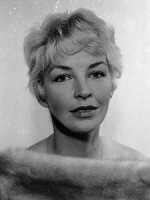
Odile Versois
(the PDG)

Jacques Dacqmine
(Le PDG)
Comments
Leave comment :
Suggestions of similar film to Nouvelle Vague
There are 178 films with the same actors, 76 films with the same director, 65759 with the same cinematographic genres (including 2206 with exactly the same 2 genres than Nouvelle Vague), to have finally 70 suggestions of similar films.If you liked Nouvelle Vague, you will probably like those similar films :
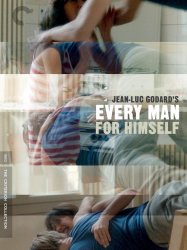
Every Man for Himself (1980)
, 1h27Directed by Jean-Luc Godard
Origin Suisse
Genres Drama
Actors Jacques Dutronc, Isabelle Huppert, Nathalie Baye, Roger Jendly, Roland Amstutz, Fred Personne
Rating64%





The film is divided into three main sections, each focusing on one of the three main characters. A prologue introduces Paul Godard, a filmmaker, and his estranged girlfriend, Denise Rimbaud. After Paul leaves the deluxe Swiss hotel where he is staying and rebuffs the sexual advances of a male hotel attendant, the film shifts to its first proper section, "The Imaginary," and follows Denise as she makes arrangements to work at the newspaper run by an old friend, or perhaps an old lover, in the Swiss countryside. Denise is struggling with her choice of giving up the apartment she shares with Paul and leaving her job at a television station, where Paul also works. She is also trying to begin a new project, possibly a novel. In the course of her arrangements, including securing a room at a farm in the countryside, Denise realizes she is late to pick up the author and filmmaker Marguerite Duras, and telephones Paul to ask if he can do it for her. Despite being put off by Denise's intention to leave him and their apartment, he agrees.
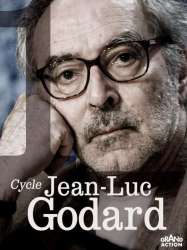
The Power of Speech (1988)
, 25minutesDirected by Jean-Luc Godard
Origin France
Genres Drama, Romance
Actors Jean Bouise, Laurence Côte, Lydia Andreï
Rating58%





Après la rupture du couple, un homme tente de joindre la femme aimée au téléphone. En miroir, un couple d’anges dialoguent à propos de la puissance matérielle de la parole.
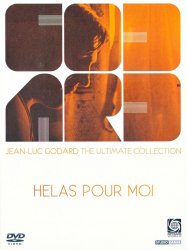
Oh, Woe Is Me (1993)
, 1h24Directed by Jean-Luc Godard
Origin France
Genres Drama, Comedy, Fantasy, Romance
Actors Gérard Depardieu, Bernard Verley, Laurence Masliah, Roland Blanche, Marc Betton, Delphine Quentin
Rating61%





Abraham Klimt arrives in a small Swiss village to investigate an incident that occurred on July 23rd, 1989 involving Rachel and Simon Donnadieu, a local couple. He interviews several of the townsfolk and enlists the aid of a poet, Aude Amiel. In flashback, the story of Rachel and Simon unfolds. Per the Greek myth on which the film is based, God, or a god, comes to earth with his assistant, Max Mercury. He decides he wants to possess Rachel Donnadieu, so he takes the form of Simon Donnadieu when Simon leaves home on a business trip. God-as-Simon returns to Rachel while Simon is away, and the two have an encounter.
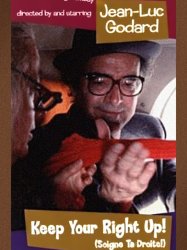
Keep Your Right Up (1987)
, 1h22Directed by Jean-Luc Godard, Richard Debuisne
Origin France
Genres Drama, Comedy, Comedy-drama, Fantasy
Actors Jacques Villeret, Jean-Luc Godard, Jane Birkin, François Périer, Pauline Lafont, Dominique Lavanant
Rating60%





Described by Godard as "a fantasy for actor, camera and tape recorder", this film is made up several sketches in which certain actors play several real or fictional roles to a background of rock music. The film is divided into three sections which inter-cross throughout. In each, a group of people search for their proper place on earth.
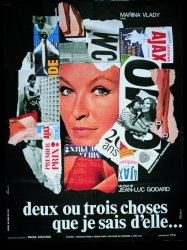 , 1h35
, 1h35Directed by Jean-Luc Godard
Origin France
Genres Drama, Comedy, Comedy-drama
Themes La banlieue française, Films about sexuality, Erotic films, Films about prostitution, Erotic thriller films
Actors Marina Vlady, Anny Duperey, Jean Narboni, Jean-Luc Godard, Raoul Lévy, Yves Beneyton
Rating64%





The film does not tell a story so much as present an essay-like study of Godard's view of contemporary life; Godard wrote that "I wanted to include everything: sports, politics, even groceries. Everything should be put in a film". Godard himself narrates the film in a whispered voice-over that discusses his fears to the audience about the contemporary world, including the Vietnam War. The film often cuts to various still shots of bright consumer products and ongoing construction.

King Lear (1987)
, 1h30Directed by Jean-Luc Godard
Origin France
Genres Drama, Comedy
Themes Théâtre, Political films, Films based on plays, Films based on works by William Shakespeare, Films about royalty
Actors Burgess Meredith, Molly Ringwald, Woody Allen, Leos Carax, Julie Delpy, Jean-Luc Godard
Rating54%





L'écrivain Norman Mailer doit écrire une nouvelle version du Roi Lear de William Shakespeare. L'histoire se déroule après la catastrophe survenue à Tchernobyl, la vie est revenue à la normale, mais l'art n'existe plus. William Shakespeare junior, cinquième du nom, se lance alors à la recherche d'oeuvres disparues. Il découvre un ponte de la mafia, Don Learo, et sa fille, Cordelia, qui entretiennent des rapports conflictuels.

In Praise of Love (2001)
, 1h37Directed by Jean-Luc Godard
Genres Drama, Romance
Actors Bruno Putzulu, Cécile Camp, Jean Davy, Jérémie Lippmann, Remo Forlani, Juliette Binoche
Rating62%





The first half of the film, shot on black and white film, follows a man named Edgar who is working on an undefined "project" about what he considers the four stages of love: meeting, physical passion, separation, and reconciliation, involving people at three different stages of life: youth, adulthood, and old age. Edgar keeps flipping through the pages of an empty book, staring intently as if waiting for words to appear. He is unsure whether the project should be a novel, a play, an opera, or a film. In Paris, he interviews potential participants from all walks of life (including those people Victor Hugo dubbed les misérables, whom Edgar considers important to the project), but is continually dissatisfied. The person Edgar really wants is someone he met two years ago, a woman who "dared speak her mind." At the urging of his financial backer Mr. Rosenthal, an art dealer whose father once owned a gallery with Edgar's grandfather, Edgar tracks down the woman, named Berthe, where she is working at night cleaning passenger cars at a railroad depot. Berthe remembers Edgar (and marvels at his memory) but emphatically does not want to be involved in his project. She holds down several jobs and also cares for her three-year-old son. Edgar continues to interview people, to his continuing dissatisfaction. He is able to visualize the stages of youth and old age but keeps having trouble with adulthood.
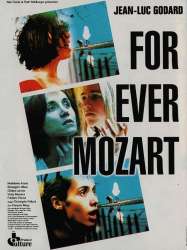
For Ever Mozart (1996)
, 1h24Directed by Jean-Luc Godard
Origin France
Genres Drama, War, Comedy, Comedy-drama
Actors Frédéric Pierrot, Ghalya Lacroix, Vicky Messica, Harry Cleven, Michel Francini, Xavier Boulanger
Rating60%





The film is divided into four parts, which Godard has subsequently given by name. In the first part, "Theater," Vicky Vitalis, an elderly film director, is casting a new project called "Fatal Bolero," assisted by his nephew, Jérôme. A group of hopeful actors lines up to audition, but Vicky is dissatisfied with each of their line readings. The director nevertheless manages to secure funding from a man called Baron Felix, who himself secures one of the actresses named Sabine, to the chagrin of Sabine's plaintive boyfriend. Later, Jérôme accompanies Vicky's daughter, Camille, a professor of philosophy, as she searches for a copy of The Game of Love and Chance, the play by Pierre de Marivaux. Her intention is to stage the play in war torn Sarajevo. However, unable to find a copy, she settles instead on the Alfred de Musset play One Must Not Trifle with Love, happily noting that she shares the same name as the play's heroine. Jérôme, smitten with his cousin, decides to go to Sarajevo with her, to his mother Sylvie's dismay. Sylvie persuades her brother Vicky to accompany them, and the family's maid, Jamila, also decides to go. Camille and Jérôme decide to cast Jamila in the play as the character Rosette.

Weekend (1967)
, 1h35Directed by Jean-Luc Godard
Origin France
Genres Drama, Comedy, Comedy-drama, Adventure, Crime
Themes Transport films, Political films, Road movies, Dystopian films
Actors Mireille Darc, Jean Yanne, Jean-Pierre Léaud, Paul Gégauff, Valérie Lagrange, Jean-Pierre Kalfon
Rating69%





Roland (Jean Yanne) and Corinne (Mireille Darc) are a bourgeois couple, although each has a secret lover and conspires to murder the other. They set out by car for Corinne's parents' home in the country to secure her inheritance from her dying father, resolving to resort to murder if necessary.

A Film Like Any Other (1968)
, 1h43Directed by Jean-Luc Godard
Genres Drama, Documentary
Rating55%





Discussions entre étudiants et ouvriers (des inconnus, parfois non filmés de face) sur ce qui s'est passé au mois de mai, sur l'occupation des usines, les agissements de la police, le désir de révolution, le tout entrecoupé de séquences muettes documentaires des manifestations de mai 1968.
 Connection
Connection